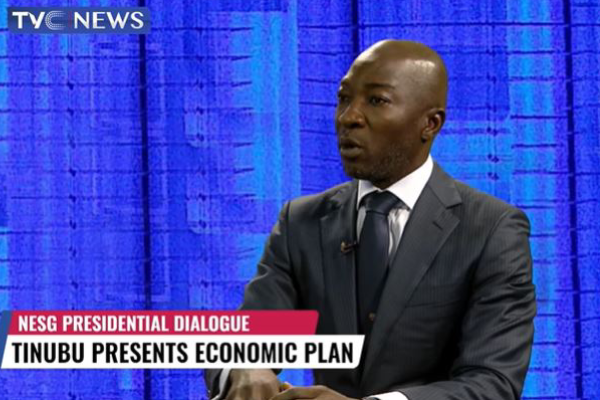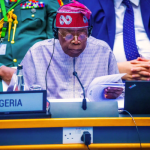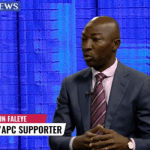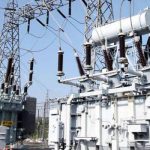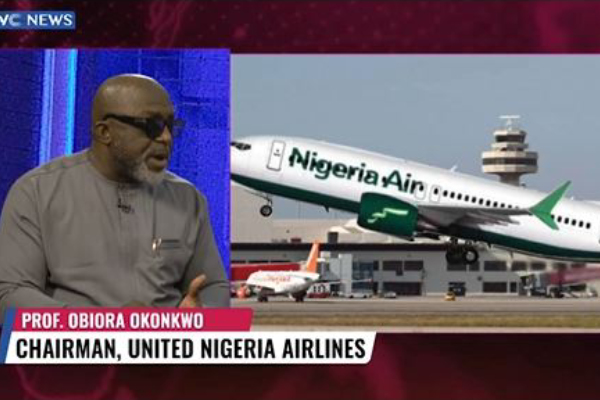With terrorism still raging across the country, it is no longer news that the porousness of Nigeria’s borders with other countries has been a huge setback in combating the problem.
While there is no denying that Nigeria’s borders are vast and, as a result, difficult to police effectively, the government should be perceived as actively seeking a solution rather than simply lamenting the situation.
The Chief of Defence Staff, (CDS) General Lucky Irabor had cause to allude to that fact when he said the other day at a public lecture that the country’s porous borders have made it easily accessible to terrorists and bandits to commit mayhem
While there can be no dispute that Nigeria’s borders are very wide, and to that extent, difficult to patrol effectively, government should be seen in vigorous pursuit of a solution to the problem; and not merely lamenting it.

Discussing Asiwaju’s Economic Plan, the issue of Nigeria’s porous borders, Seun Faleye, Lawyer/APC member said the porosity of our border has always been a concern from time in memorial.
According to him, what is required now is to deploy cutting edge technology to at least bridge where the human capital or human resource cannot do which will be a combination of both from what we’ve seen in Asiwaju’s manifesto.
He added that there will be renewed focus on border control by the work that immigration and customs do, basically to ensure that what comes in and what goes out are well noted.
Mr. Faleye said technology will play a very important role, but we see that effect on two things sometimes we need to be careful how trade restrictions also play a part in this heightened smuggling states which is what Asiwaju was emphasising on at the economic summit.
At the summit the APC presidential candidate was saying that we look at some of the trade restrictions that have been put in place in the past, they’ve done nothing but to encourage smuggling, increase production costs. And if we’re losing those trade restrictions and get our border right, then we’ll see a net flow of trade in and out.
“When you look at PMS subsidy, we’ve also seen that one of the key benefits or beneficiaries of subsidy regime in Nigeria are the neighboring states.
“We will remove that subsidy not only because we want to divert the cash that we will save from that into social initiatives, social beneficial programs, and healthcare, education and infrastructure, but we will stop the third party countries from availing benefit of our subsidy plan. So border control lies smack in the heart of all of these to ensure that nothing leaves our country that cannot be accounted for in a lot more credible manner.
Mr Faleye noted that while Nigeria is a large market which a lot of people want to come to from other countries but that must be done in a sustainable manner.
“Nigeria is a large market, and a lot of people come from West Africa to trade and shop in Lagos markets. A lot of people come from Cameroon to trade and shop in Aba market, we must allow that access so that we can benefit from it.
“It will be to our benefits, ultimately taking advantage of ECOWAS free trade movement to allow for sustainable movement of goods and services, but certainly not for non state actors, not for people that are looking to undermine our economy and our security.
With terrorism still raging across the country, it is no longer news that the porousness of Nigeria’s borders with other countries has been a huge setback in combating the problem.
While there is no denying that Nigeria’s borders are vast and, as a result, difficult to police effectively, the government should be perceived as actively seeking a solution rather than simply lamenting the situation.
The Chief of Defence Staff, (CDS) General Lucky Irabor had cause to allude to that fact when he said the other day at a public lecture that the country’s porous borders have made it easily accessible to terrorists and bandits to commit mayhem
While there can be no dispute that Nigeria’s borders are very wide, and to that extent, difficult to patrol effectively, government should be seen in vigorous pursuit of a solution to the problem; and not merely lamenting it.

Discussing Asiwaju’s Economic Plan, the issue of Nigeria’s porous borders, Seun Faleye, Lawyer/APC member said the porosity of our border has always been a concern from time in memorial.
According to him, what is required now is to deploy cutting edge technology to at least bridge where the human capital or human resource cannot do which will be a combination of both from what we’ve seen in Asiwaju’s manifesto.
He added that there will be renewed focus on border control by the work that immigration and customs do, basically to ensure that what comes in and what goes out are well noted.
Mr. Faleye said technology will play a very important role, but we see that effect on two things sometimes we need to be careful how trade restrictions also play a part in this heightened smuggling states which is what Asiwaju was emphasising on at the economic summit.
At the summit the APC presidential candidate was saying that we look at some of the trade restrictions that have been put in place in the past, they’ve done nothing but to encourage smuggling, increase production costs. And if we’re losing those trade restrictions and get our border right, then we’ll see a net flow of trade in and out.
“When you look at PMS subsidy, we’ve also seen that one of the key benefits or beneficiaries of subsidy regime in Nigeria are the neighboring states.
“We will remove that subsidy not only because we want to divert the cash that we will save from that into social initiatives, social beneficial programs, and healthcare, education and infrastructure, but we will stop the third party countries from availing benefit of our subsidy plan. So border control lies smack in the heart of all of these to ensure that nothing leaves our country that cannot be accounted for in a lot more credible manner.
Mr Faleye noted that while Nigeria is a large market which a lot of people want to come to from other countries but that must be done in a sustainable manner.
“Nigeria is a large market, and a lot of people come from West Africa to trade and shop in Lagos markets. A lot of people come from Cameroon to trade and shop in Aba market, we must allow that access so that we can benefit from it.
“It will be to our benefits, ultimately taking advantage of ECOWAS free trade movement to allow for sustainable movement of goods and services, but certainly not for non state actors, not for people that are looking to undermine our economy and our security.
With terrorism still raging across the country, it is no longer news that the porousness of Nigeria’s borders with other countries has been a huge setback in combating the problem.
While there is no denying that Nigeria’s borders are vast and, as a result, difficult to police effectively, the government should be perceived as actively seeking a solution rather than simply lamenting the situation.
The Chief of Defence Staff, (CDS) General Lucky Irabor had cause to allude to that fact when he said the other day at a public lecture that the country’s porous borders have made it easily accessible to terrorists and bandits to commit mayhem
While there can be no dispute that Nigeria’s borders are very wide, and to that extent, difficult to patrol effectively, government should be seen in vigorous pursuit of a solution to the problem; and not merely lamenting it.

Discussing Asiwaju’s Economic Plan, the issue of Nigeria’s porous borders, Seun Faleye, Lawyer/APC member said the porosity of our border has always been a concern from time in memorial.
According to him, what is required now is to deploy cutting edge technology to at least bridge where the human capital or human resource cannot do which will be a combination of both from what we’ve seen in Asiwaju’s manifesto.
He added that there will be renewed focus on border control by the work that immigration and customs do, basically to ensure that what comes in and what goes out are well noted.
Mr. Faleye said technology will play a very important role, but we see that effect on two things sometimes we need to be careful how trade restrictions also play a part in this heightened smuggling states which is what Asiwaju was emphasising on at the economic summit.
At the summit the APC presidential candidate was saying that we look at some of the trade restrictions that have been put in place in the past, they’ve done nothing but to encourage smuggling, increase production costs. And if we’re losing those trade restrictions and get our border right, then we’ll see a net flow of trade in and out.
“When you look at PMS subsidy, we’ve also seen that one of the key benefits or beneficiaries of subsidy regime in Nigeria are the neighboring states.
“We will remove that subsidy not only because we want to divert the cash that we will save from that into social initiatives, social beneficial programs, and healthcare, education and infrastructure, but we will stop the third party countries from availing benefit of our subsidy plan. So border control lies smack in the heart of all of these to ensure that nothing leaves our country that cannot be accounted for in a lot more credible manner.
Mr Faleye noted that while Nigeria is a large market which a lot of people want to come to from other countries but that must be done in a sustainable manner.
“Nigeria is a large market, and a lot of people come from West Africa to trade and shop in Lagos markets. A lot of people come from Cameroon to trade and shop in Aba market, we must allow that access so that we can benefit from it.
“It will be to our benefits, ultimately taking advantage of ECOWAS free trade movement to allow for sustainable movement of goods and services, but certainly not for non state actors, not for people that are looking to undermine our economy and our security.
With terrorism still raging across the country, it is no longer news that the porousness of Nigeria’s borders with other countries has been a huge setback in combating the problem.
While there is no denying that Nigeria’s borders are vast and, as a result, difficult to police effectively, the government should be perceived as actively seeking a solution rather than simply lamenting the situation.
The Chief of Defence Staff, (CDS) General Lucky Irabor had cause to allude to that fact when he said the other day at a public lecture that the country’s porous borders have made it easily accessible to terrorists and bandits to commit mayhem
While there can be no dispute that Nigeria’s borders are very wide, and to that extent, difficult to patrol effectively, government should be seen in vigorous pursuit of a solution to the problem; and not merely lamenting it.

Discussing Asiwaju’s Economic Plan, the issue of Nigeria’s porous borders, Seun Faleye, Lawyer/APC member said the porosity of our border has always been a concern from time in memorial.
According to him, what is required now is to deploy cutting edge technology to at least bridge where the human capital or human resource cannot do which will be a combination of both from what we’ve seen in Asiwaju’s manifesto.
He added that there will be renewed focus on border control by the work that immigration and customs do, basically to ensure that what comes in and what goes out are well noted.
Mr. Faleye said technology will play a very important role, but we see that effect on two things sometimes we need to be careful how trade restrictions also play a part in this heightened smuggling states which is what Asiwaju was emphasising on at the economic summit.
At the summit the APC presidential candidate was saying that we look at some of the trade restrictions that have been put in place in the past, they’ve done nothing but to encourage smuggling, increase production costs. And if we’re losing those trade restrictions and get our border right, then we’ll see a net flow of trade in and out.
“When you look at PMS subsidy, we’ve also seen that one of the key benefits or beneficiaries of subsidy regime in Nigeria are the neighboring states.
“We will remove that subsidy not only because we want to divert the cash that we will save from that into social initiatives, social beneficial programs, and healthcare, education and infrastructure, but we will stop the third party countries from availing benefit of our subsidy plan. So border control lies smack in the heart of all of these to ensure that nothing leaves our country that cannot be accounted for in a lot more credible manner.
Mr Faleye noted that while Nigeria is a large market which a lot of people want to come to from other countries but that must be done in a sustainable manner.
“Nigeria is a large market, and a lot of people come from West Africa to trade and shop in Lagos markets. A lot of people come from Cameroon to trade and shop in Aba market, we must allow that access so that we can benefit from it.
“It will be to our benefits, ultimately taking advantage of ECOWAS free trade movement to allow for sustainable movement of goods and services, but certainly not for non state actors, not for people that are looking to undermine our economy and our security.
With terrorism still raging across the country, it is no longer news that the porousness of Nigeria’s borders with other countries has been a huge setback in combating the problem.
While there is no denying that Nigeria’s borders are vast and, as a result, difficult to police effectively, the government should be perceived as actively seeking a solution rather than simply lamenting the situation.
The Chief of Defence Staff, (CDS) General Lucky Irabor had cause to allude to that fact when he said the other day at a public lecture that the country’s porous borders have made it easily accessible to terrorists and bandits to commit mayhem
While there can be no dispute that Nigeria’s borders are very wide, and to that extent, difficult to patrol effectively, government should be seen in vigorous pursuit of a solution to the problem; and not merely lamenting it.

Discussing Asiwaju’s Economic Plan, the issue of Nigeria’s porous borders, Seun Faleye, Lawyer/APC member said the porosity of our border has always been a concern from time in memorial.
According to him, what is required now is to deploy cutting edge technology to at least bridge where the human capital or human resource cannot do which will be a combination of both from what we’ve seen in Asiwaju’s manifesto.
He added that there will be renewed focus on border control by the work that immigration and customs do, basically to ensure that what comes in and what goes out are well noted.
Mr. Faleye said technology will play a very important role, but we see that effect on two things sometimes we need to be careful how trade restrictions also play a part in this heightened smuggling states which is what Asiwaju was emphasising on at the economic summit.
At the summit the APC presidential candidate was saying that we look at some of the trade restrictions that have been put in place in the past, they’ve done nothing but to encourage smuggling, increase production costs. And if we’re losing those trade restrictions and get our border right, then we’ll see a net flow of trade in and out.
“When you look at PMS subsidy, we’ve also seen that one of the key benefits or beneficiaries of subsidy regime in Nigeria are the neighboring states.
“We will remove that subsidy not only because we want to divert the cash that we will save from that into social initiatives, social beneficial programs, and healthcare, education and infrastructure, but we will stop the third party countries from availing benefit of our subsidy plan. So border control lies smack in the heart of all of these to ensure that nothing leaves our country that cannot be accounted for in a lot more credible manner.
Mr Faleye noted that while Nigeria is a large market which a lot of people want to come to from other countries but that must be done in a sustainable manner.
“Nigeria is a large market, and a lot of people come from West Africa to trade and shop in Lagos markets. A lot of people come from Cameroon to trade and shop in Aba market, we must allow that access so that we can benefit from it.
“It will be to our benefits, ultimately taking advantage of ECOWAS free trade movement to allow for sustainable movement of goods and services, but certainly not for non state actors, not for people that are looking to undermine our economy and our security.
With terrorism still raging across the country, it is no longer news that the porousness of Nigeria’s borders with other countries has been a huge setback in combating the problem.
While there is no denying that Nigeria’s borders are vast and, as a result, difficult to police effectively, the government should be perceived as actively seeking a solution rather than simply lamenting the situation.
The Chief of Defence Staff, (CDS) General Lucky Irabor had cause to allude to that fact when he said the other day at a public lecture that the country’s porous borders have made it easily accessible to terrorists and bandits to commit mayhem
While there can be no dispute that Nigeria’s borders are very wide, and to that extent, difficult to patrol effectively, government should be seen in vigorous pursuit of a solution to the problem; and not merely lamenting it.

Discussing Asiwaju’s Economic Plan, the issue of Nigeria’s porous borders, Seun Faleye, Lawyer/APC member said the porosity of our border has always been a concern from time in memorial.
According to him, what is required now is to deploy cutting edge technology to at least bridge where the human capital or human resource cannot do which will be a combination of both from what we’ve seen in Asiwaju’s manifesto.
He added that there will be renewed focus on border control by the work that immigration and customs do, basically to ensure that what comes in and what goes out are well noted.
Mr. Faleye said technology will play a very important role, but we see that effect on two things sometimes we need to be careful how trade restrictions also play a part in this heightened smuggling states which is what Asiwaju was emphasising on at the economic summit.
At the summit the APC presidential candidate was saying that we look at some of the trade restrictions that have been put in place in the past, they’ve done nothing but to encourage smuggling, increase production costs. And if we’re losing those trade restrictions and get our border right, then we’ll see a net flow of trade in and out.
“When you look at PMS subsidy, we’ve also seen that one of the key benefits or beneficiaries of subsidy regime in Nigeria are the neighboring states.
“We will remove that subsidy not only because we want to divert the cash that we will save from that into social initiatives, social beneficial programs, and healthcare, education and infrastructure, but we will stop the third party countries from availing benefit of our subsidy plan. So border control lies smack in the heart of all of these to ensure that nothing leaves our country that cannot be accounted for in a lot more credible manner.
Mr Faleye noted that while Nigeria is a large market which a lot of people want to come to from other countries but that must be done in a sustainable manner.
“Nigeria is a large market, and a lot of people come from West Africa to trade and shop in Lagos markets. A lot of people come from Cameroon to trade and shop in Aba market, we must allow that access so that we can benefit from it.
“It will be to our benefits, ultimately taking advantage of ECOWAS free trade movement to allow for sustainable movement of goods and services, but certainly not for non state actors, not for people that are looking to undermine our economy and our security.
With terrorism still raging across the country, it is no longer news that the porousness of Nigeria’s borders with other countries has been a huge setback in combating the problem.
While there is no denying that Nigeria’s borders are vast and, as a result, difficult to police effectively, the government should be perceived as actively seeking a solution rather than simply lamenting the situation.
The Chief of Defence Staff, (CDS) General Lucky Irabor had cause to allude to that fact when he said the other day at a public lecture that the country’s porous borders have made it easily accessible to terrorists and bandits to commit mayhem
While there can be no dispute that Nigeria’s borders are very wide, and to that extent, difficult to patrol effectively, government should be seen in vigorous pursuit of a solution to the problem; and not merely lamenting it.

Discussing Asiwaju’s Economic Plan, the issue of Nigeria’s porous borders, Seun Faleye, Lawyer/APC member said the porosity of our border has always been a concern from time in memorial.
According to him, what is required now is to deploy cutting edge technology to at least bridge where the human capital or human resource cannot do which will be a combination of both from what we’ve seen in Asiwaju’s manifesto.
He added that there will be renewed focus on border control by the work that immigration and customs do, basically to ensure that what comes in and what goes out are well noted.
Mr. Faleye said technology will play a very important role, but we see that effect on two things sometimes we need to be careful how trade restrictions also play a part in this heightened smuggling states which is what Asiwaju was emphasising on at the economic summit.
At the summit the APC presidential candidate was saying that we look at some of the trade restrictions that have been put in place in the past, they’ve done nothing but to encourage smuggling, increase production costs. And if we’re losing those trade restrictions and get our border right, then we’ll see a net flow of trade in and out.
“When you look at PMS subsidy, we’ve also seen that one of the key benefits or beneficiaries of subsidy regime in Nigeria are the neighboring states.
“We will remove that subsidy not only because we want to divert the cash that we will save from that into social initiatives, social beneficial programs, and healthcare, education and infrastructure, but we will stop the third party countries from availing benefit of our subsidy plan. So border control lies smack in the heart of all of these to ensure that nothing leaves our country that cannot be accounted for in a lot more credible manner.
Mr Faleye noted that while Nigeria is a large market which a lot of people want to come to from other countries but that must be done in a sustainable manner.
“Nigeria is a large market, and a lot of people come from West Africa to trade and shop in Lagos markets. A lot of people come from Cameroon to trade and shop in Aba market, we must allow that access so that we can benefit from it.
“It will be to our benefits, ultimately taking advantage of ECOWAS free trade movement to allow for sustainable movement of goods and services, but certainly not for non state actors, not for people that are looking to undermine our economy and our security.
With terrorism still raging across the country, it is no longer news that the porousness of Nigeria’s borders with other countries has been a huge setback in combating the problem.
While there is no denying that Nigeria’s borders are vast and, as a result, difficult to police effectively, the government should be perceived as actively seeking a solution rather than simply lamenting the situation.
The Chief of Defence Staff, (CDS) General Lucky Irabor had cause to allude to that fact when he said the other day at a public lecture that the country’s porous borders have made it easily accessible to terrorists and bandits to commit mayhem
While there can be no dispute that Nigeria’s borders are very wide, and to that extent, difficult to patrol effectively, government should be seen in vigorous pursuit of a solution to the problem; and not merely lamenting it.

Discussing Asiwaju’s Economic Plan, the issue of Nigeria’s porous borders, Seun Faleye, Lawyer/APC member said the porosity of our border has always been a concern from time in memorial.
According to him, what is required now is to deploy cutting edge technology to at least bridge where the human capital or human resource cannot do which will be a combination of both from what we’ve seen in Asiwaju’s manifesto.
He added that there will be renewed focus on border control by the work that immigration and customs do, basically to ensure that what comes in and what goes out are well noted.
Mr. Faleye said technology will play a very important role, but we see that effect on two things sometimes we need to be careful how trade restrictions also play a part in this heightened smuggling states which is what Asiwaju was emphasising on at the economic summit.
At the summit the APC presidential candidate was saying that we look at some of the trade restrictions that have been put in place in the past, they’ve done nothing but to encourage smuggling, increase production costs. And if we’re losing those trade restrictions and get our border right, then we’ll see a net flow of trade in and out.
“When you look at PMS subsidy, we’ve also seen that one of the key benefits or beneficiaries of subsidy regime in Nigeria are the neighboring states.
“We will remove that subsidy not only because we want to divert the cash that we will save from that into social initiatives, social beneficial programs, and healthcare, education and infrastructure, but we will stop the third party countries from availing benefit of our subsidy plan. So border control lies smack in the heart of all of these to ensure that nothing leaves our country that cannot be accounted for in a lot more credible manner.
Mr Faleye noted that while Nigeria is a large market which a lot of people want to come to from other countries but that must be done in a sustainable manner.
“Nigeria is a large market, and a lot of people come from West Africa to trade and shop in Lagos markets. A lot of people come from Cameroon to trade and shop in Aba market, we must allow that access so that we can benefit from it.
“It will be to our benefits, ultimately taking advantage of ECOWAS free trade movement to allow for sustainable movement of goods and services, but certainly not for non state actors, not for people that are looking to undermine our economy and our security.

